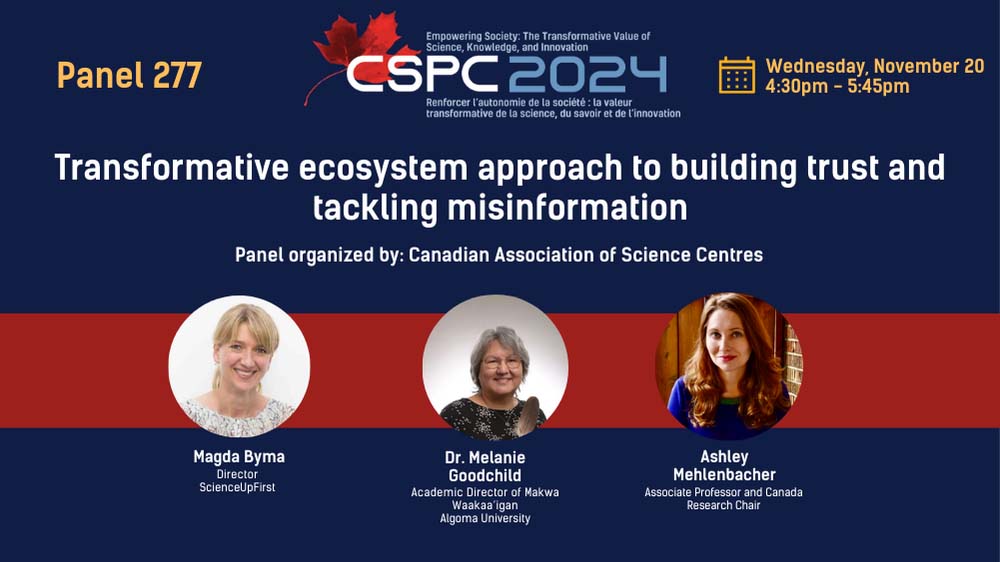Abstract:
This panel will explore the complex challenges of tackling misinformation and building public trust through an ecosystem framework that considers the conditions of a system, emergence, adaptation, and a web of interdependent relationships. We will weave narratives, case studies, and theory to explore how to: – Nurture and constantly re-earn trust. – Build collaborations that would not exist without intervention. – Connect the people and organizations doing amazing work and resource them. – Help the system “see itself” and in doing so break down silos and duplicated disconnected efforts. – Identify levers of change within the system. – Nurture multiple interconnected initiatives at the same time.
Summary of Conversations
The panel explored transformative approaches to building trust and tackling misinformation, emphasizing the importance of integrating Indigenous ways of knowing with Western scientific thought. The discussion highlighted communication gaps and trust deficits, particularly during the pandemic, where communities faced barriers to accurate information due to language and cultural relevance. Strategies for addressing these issues included community-led initiatives, relationship-building based on transparency and commitment, and the recognition of qualitative data alongside quantitative metrics. The conversation covered the significance of cultural fluency, respecting diverse belief systems, and the limitations of English in describing living systems. The importance of ethical space and honouring indigenous wisdom was also discussed.
Take Away Messages/ Current Status of Challenges
Here are the key takeaway messages and cthe urrent status of challenges discussed:
- Trust Deficits: Many communities have trust issues with governmental bodies and large organizations due to historical and ongoing systemic barriers.
- Communication Gaps: Significant communication gaps exist, particularly regarding language accessibility and cultural relevance, leading to the spread of misinformation.
- Relationship Building: Building trust requires time, transparency, and a commitment to fostering relationships with communities.
- Data Interpretation: Data collection and research processes must involve community members at every level to ensure trustworthiness and prevent potential harm.
- Qualitative vs. Quantitative Data: Funders and institutions need to recognize the importance of qualitative data, such as community happiness, alongside quantitative outcomes.
- Scientific Expediency: An overemphasis on expediency in science can foreclose possibilities and erode trust by undermining basic research.
- Cultural Appropriation: Appropriating Indigenous knowledge without context or respect can perpetuate mistrust and harm.
- Systemic Mistrust: Mistrust in institutions often stems from perceived disservice or harm, requiring institutions to demonstrate their value and commitment to serving diverse communities.
Recommendations/Next Steps
Here are some recommendations and next steps proposed to address the challenges:
- Community-Led Initiatives: Support and empower community organizations to lead information dissemination and engagement efforts within their communities.
- Language Accessibility: Ensure accurate information is available in multiple languages to overcome language-based barriers.
- Relationship-Focused Approach: Prioritize relationship-building with communities, emphasizing transparency, respect, and ongoing dialogue.
- Integrate Indigenous Knowledge: Incorporate Indigenous ways of knowing into scientific processes and decision-making, recognizing their value and validity.
- Holistic Metrics: Adopt holistic metrics that consider qualitative data, such as community well-being and happiness, alongside quantitative outcomes.
- Promote Basic Science: Advocate for the importance of basic science and resist the pressure for solely expedient research.
- Cultural Fluency Training: Encourage scientists and decision-makers to develop cultural fluency and engage in respectful dialogue with diverse communities.
- Address Power Dynamics: Actively work to address power imbalances and systemic inequities that contribute to mistrust in institutions.
* This summary has been generated with the assistance of AI tools


